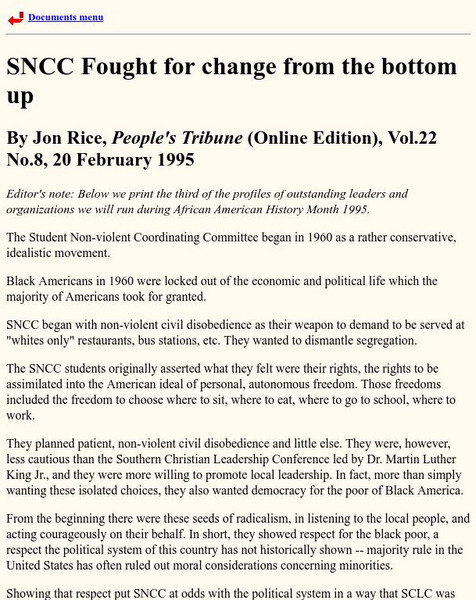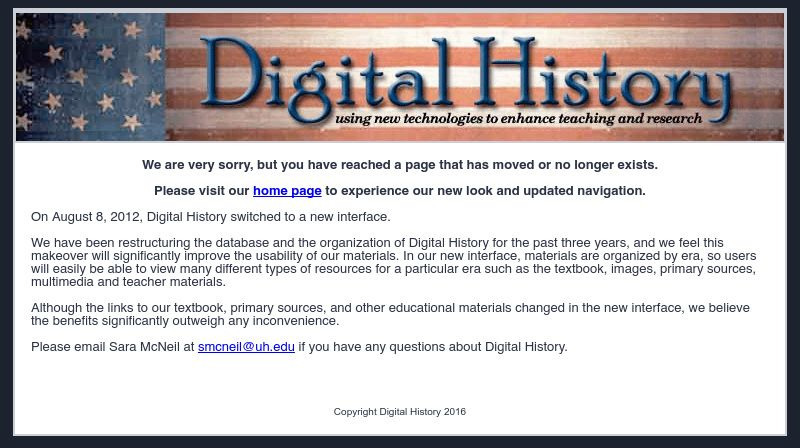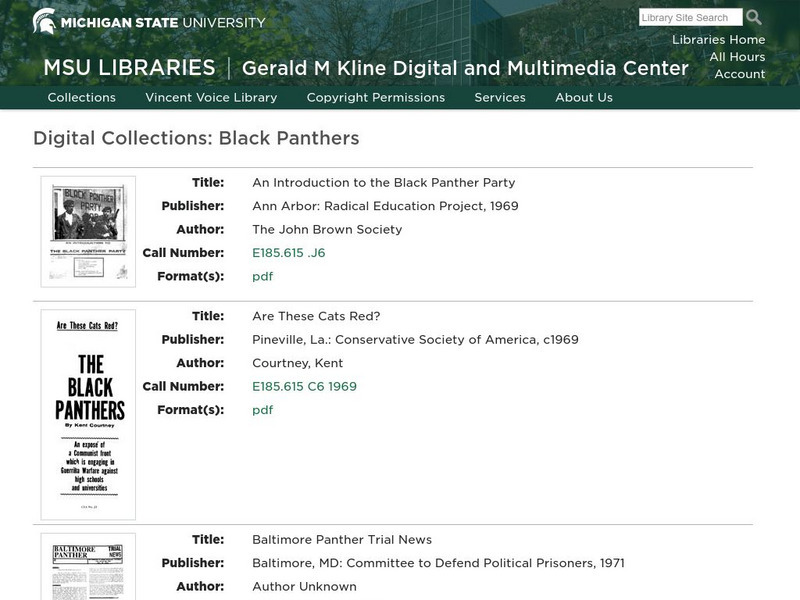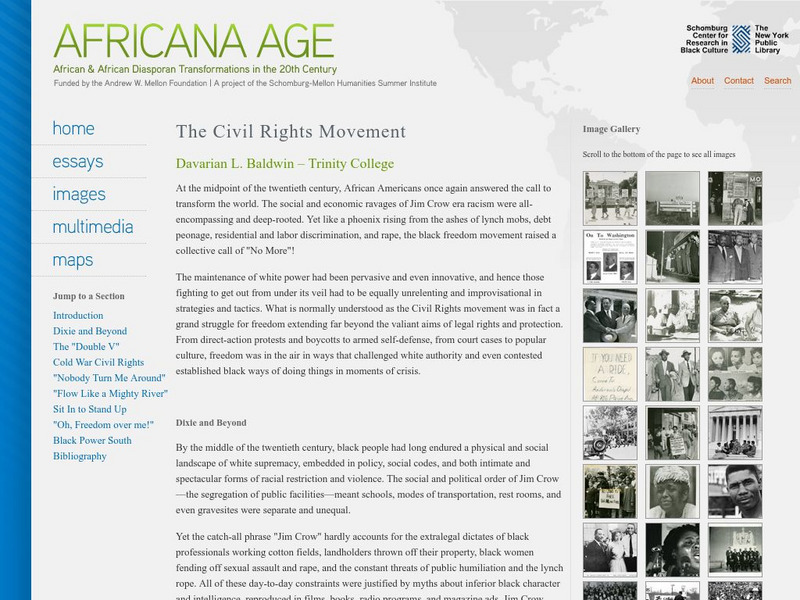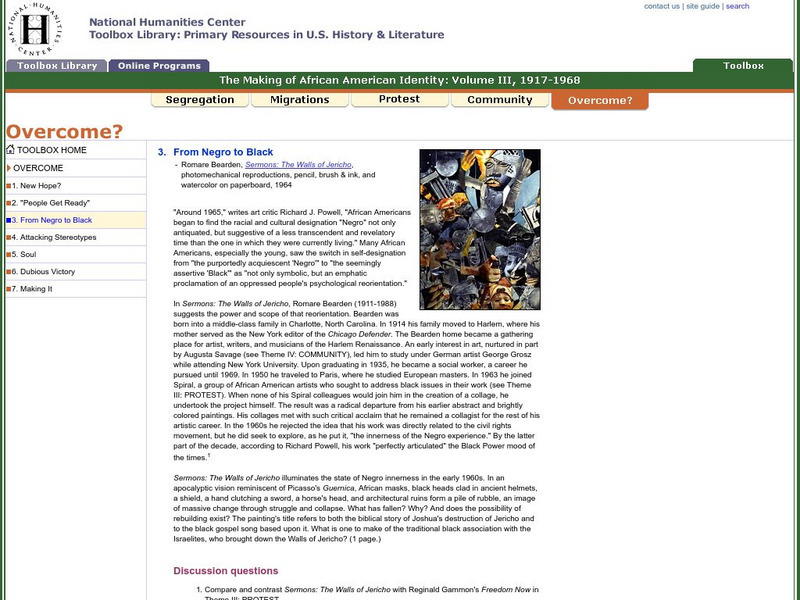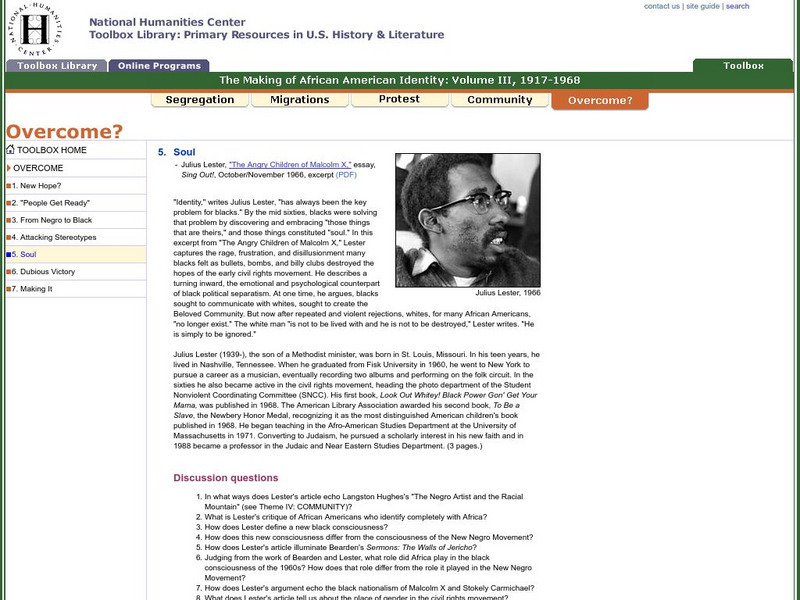Alabama Learning Exchange
African American Civil Rights Movement
An excellent resource defines the African-American Civil Rights Movement from the early 1900s through the legacy left in modern times. Every major date, event, and key player is described under clear overarching categories. The NAACP,...
Curated OER
The Impact of the Civil Rights Movement
Deepen understanding of the Civil Rights Movement with this collection of primary documents. This resource contains 22 video transcripts about desegregation, voting rights, black power, Dr. Martin Luther King Jr., and more. You might...
Curated OER
New Voices for African Americans
Eleventh graders study Malcolm X and black power. In this African American lesson, 11th graders write a journal entry about black power and create a timeline of the events during the civil right movement.
Curated OER
The Student Non-Violent Coordinating Committee
Students identify and analyze the motivation behind the African-American students in organizing the sit-in if Greensboro and the formation of the SNCC. Students identify how the generational differences between members of SNCC and other...
Columbia University
Columbia University: Rediscovering Malcolm's Life [Pdf]
A scholarly discussion on how the views have change with regard to Malcolm X, from fiery "Black Power" radical to an accepted part of the African American heritage.
Columbia University
Columbia University: The Price of Freedom [Pdf]
A lengthy interview with Mr. Ferguson who was a very early follower of Malcolm X and who was present at the assassination of the famous African American leader.
Hartford Web Publishing
World History Archives: Sncc Fought for Change From the Bottom Up
A highly informative narrative on the development and philosophy of the Student Nonviolent Coordinating Committee, with comparisons to Dr. King's SCLC and the Black Panther Party. Good resource.
Digital History
Digital History: Black Nationalism and Black Power
There were two methods of protesting discrimination of African Americans during the Civil Rights Movement: follow Martin Luther King, Jr. or Malcolm X. Find out about the Black Panther Party, Black Nationalism, and Black Power.
Stanford University
Stanford University: Lesson Plan on Martin Luther King, Jr. & Malcolm X
A comprehensive four part lesson plan exploring how the ideas of the two great African American leaders were similar and different both in their ideologies and their visions.
OpenStax
Open Stax: Contesting Futures: America in 1960s: Civil Rights Movement Marches On
An examination of the civil rights movement of African Americans in the 1960s. Discusses the different forms of protest, the influence of Martin Luther King, Jr., the rise of Black Power, the Black Panthers, and Malcolm X. This is...
Michigan State University
Michigan State University: Msu Libraries: Digital Collections: Black Panthers
Primary source documents related to the Black Panthers movement, a radical group that originated as a response to unchecked police brutality against blacks in the U.S. All materials can be downloaded.
A&E Television
History.com: Black History Milestones
A detailed account of the history of African Americans is presented in this article. Divided by main topics or periods of time, the coming of slavery to America is the first focus. Followed by plantation life and escapes to freedom and...
Other
New York Public Library: Africana Age: The Civil Rights Movement
This is an extensive review of the Civil Rights movement from the 1940s to the 1960s. Read about the ways African Americans protested discrimination in employment and education over several years. Be sure to click on the images to find...
National Humanities Center
National Humanities Center: Teacher Serve: Freedom's Story: The Civil Rights Movement: 1968 2008
An excellent essay from the National Humanities Center that explores the civil rights movement after the groundbreaking legislation in the 1960s. It looks at how the civil rights movement has transitioned in the last part of the 20th and...
PBS
Pbs Learning Media: Kwame Ture, Stokely Carmichael
In this transcript of an interview recorded for Eyes on the Prize, Stokely Carmichael describes SNCC organizing campaigns and his views on "Black Power."
PBS
Pbs Learning Media: Primary Source Set: The Black Power Movement
This collection uses primary sources to explore the Black Power Movement.
PBS
Pbs Learning Media: Malcolm X: Minister and Civil Rights Activist
By watching a short video and engaging with two primary sources, students will examine the life of this inspiring, controversial, and dynamic leader.
PBS
Pbs Learning Media: 1968: A Time of Change
Explore how the events and cultural and political changes that occurred in 1968 came to represent the upheaval and dramatic changes in American life during the 1960s.
Columbia University
Columbia University: The Unfinished Dialogue of m.l. King, Jr. & Malcolm X [Pdf]
A scholarly article examining the issue of whether Malcolm X and Dr. King could have ever reconciled their different visions of Black America.
National Humanities Center
National Humanities Center: Toolbox Library: Theater, Making of African American Identity: V. 3
A manifesto and scenes from a play illustrating black protest in the theater. LeRoi Jones's short manifesto, "The Revolutionary Theatre," and Douglas Turner Ward's, " Day of Absence" encapsulates the mindset of many black writers and...
National Humanities Center
National Humanities Center: Toolbox Library: Community and Culture, Making of African American Identity: V. 3
An attempt to define community as a shared culture. In this article and review, critic, poet, and playwright Larry Neal (1937-1981) applies the principles of self-determination espoused by Stokely Carmichael and others to the arts and...
National Humanities Center
National Humanities Center: Toolbox Library: From Negro to Black, Making of African American Identity: V. 3
A painting that expresses the darkening hopes of the civil rights movement. It explores the obstacles the civil rights movement had to overcome and the movement's effect on the lives of African Americans.
National Humanities Center
National Humanities Center: Toolbox Library: Attacking Stereotypes, Making of African American Identity: V. 3
Two images that express the growing militancy of the civil rights movement in the 1960s. This article explains how Joe Overstreet (1934-) and Betye Saar (1929-) went head to head with the formidable Aunt Jemima and with wit and irony...
National Humanities Center
National Humanities Center: Toolbox Library: Soul, Making of African American Identity: V. 3
An article that expresses the late 1960s disillusionment of the civil rights movement. It explores the obstacles the civil rights movement had to overcome and the movement's affect on the lives of African Americans.






![Columbia University: Rediscovering Malcolm's Life [Pdf] Handout Columbia University: Rediscovering Malcolm's Life [Pdf] Handout](https://d15y2dacu3jp90.cloudfront.net/images/attachment_defaults/resource/large/FPO-knovation.png)
